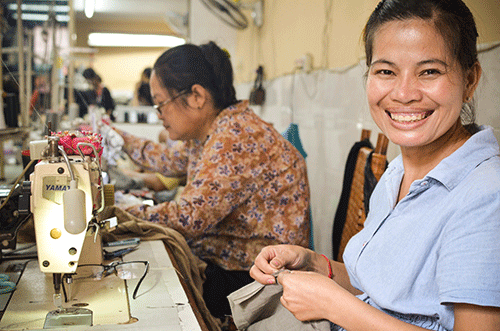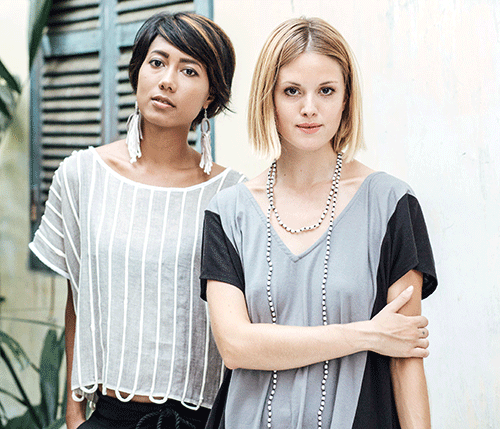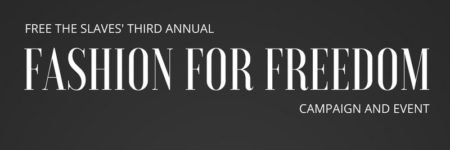Fashion trends at affordable costs: it attracts consumers, but what about the workers who make the clothes? While shoppers browse the aisles of big-brand on-trend clothing, millions are enslaved around the world in big-brand supply chains.
That’s why Free the Slaves has established the Fashion for Freedom Campaign. Our supporters are eager to take action beyond making a donation. This year we’re hosting an exciting and exclusive event in New York City July 28 where supporters can shop, learn, and honor the work of fashion activists and anti-slavery leaders.
Ethical fashionista Rachel Faller is the curator of tonlé, one of the featured brands at the upcoming event.
“In college, I studied textiles and fine arts and wanted to do something that brought together my passion for social justice and textile art, but I was having a really hard time seeing myself going into the fashion industry,” Faller said.
After graduating college in 2008, Faller had an opportunity to travel to Cambodia with a family friend. There, she met artisans working in fair trade organizations. For the first time, she saw there was a way to blend her passion for designing and making clothing. She was eager to positively impact the world around her by creating clothing that was meaningful and would not contribute to the harmful practices she saw in the fashion industry. Faller returned to Cambodia under a Fulbright grant, and for a year she learned about what was working with fair trade projects, and what wasn’t. That’s when Faller decided to start her own business.
“I utilized traditional techniques with fair trade methods and combined it with more moderate and contemporary designs I could see myself wearing on a daily basis,” she said.
As a zero-waste brand, tonlé combats the huge amount of waste in the garment industry by utilizing what is already available, recycling waste from other textile factories.

“Larger pieces are cut into dresses and shirts, smaller scraps are knit into new fabrics and even the tiniest scraps leftover are made into paper,” Faller explained. “Every piece of raw material that we use is important, and nothing is considered waste.”
The brand’s mission, every thread matters, is one of the first phrases on the company’s webpage. It means that this is not just one company but an intertwined blend of other ethical fashion brands, advocates, and consumers – all working to stitch together a path toward a better tomorrow.
“We see our brand as a community. For me it’s not just about being a company and making money. It’s about connecting all different people from our customers to our wholesale buyers to our people who support our company on so many levels,” Faller said. “The tagline ‘every thread matters’ is an acknowledgement of just that, that every person along the way is important.”
Faller spoke on the importance of events like Fashion for Freedom 2018 to approach the conversation from a positive point of view, supporting the community and communicating through education and advocacy rather than negating other labels or companies.
“We believe style is more than what you wear – it’s what you choose to be a part of,” she said.

There is strength in numbers, and the Fashion for Freedom event on July 28 creates a vital gathering of ethical brands, advocating for each to accomplish radical change. Faller says the event will allow consumers to see the possibilities of their actions.
In a world of online shoppers and those searching for the easiest and quickest solution to issues, Faller makes a critical point: for the sustainable fashion industry to have widespread impact, it must meet people where they currently are and offer clothing that is ethically produced.
“Further, I think that activists and people pushing from the outside have a big role to play. Large brands won’t change unless there is pressure from activists and customers. Those are the campaigns that really work. If there is enough pressure, that’s how they will change,” Faller said.
There are great brands doing things differently, and Faller encourages each individual consumer to do the digging and not give up.
“The support of each individual customer means so much to us and I encourage people to not give up on the idea that this is possible,” she said. “As discouraging as it is what’s going on in the fashion industry, there are a lot of positive people trying to make a difference and need that support.”

